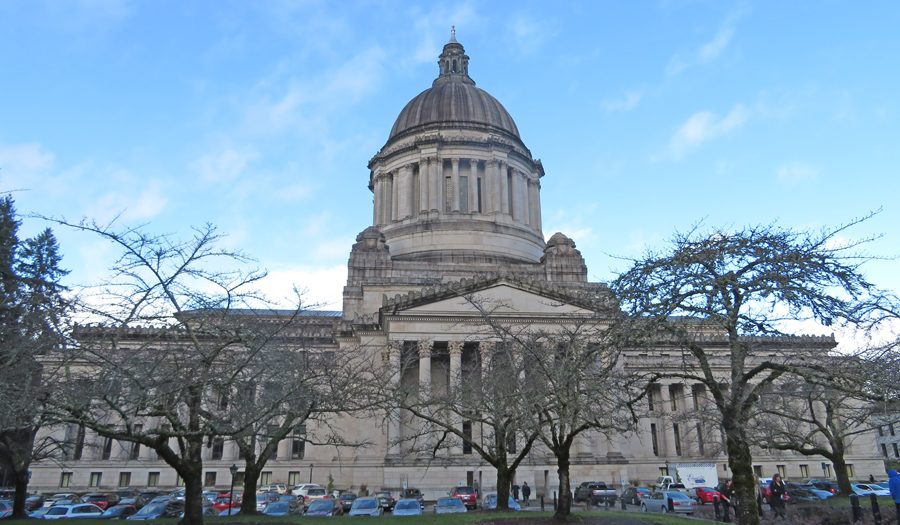
Home » Tri-City business backers oppose governor’s tax, dam removal proposals
Tri-City business backers oppose governor’s tax, dam removal proposals

January 13, 2019
Gov. Jay Inslee’s proposed capital gains tax has dominated the headlines. But his less-ballyhooed proposal to increase business-and-occupation taxes might have a bigger effect on the Tri-Cities, while having a greater impact on the state budget.
These two tax proposals, plus a proposed study on removing the four lower Snake River dams, are the biggest items that the Washington Legislature could ponder in the 2019 session that could affect Tri-City businesses.
The session began Jan. 14.
The tax proposals come from Inslee wanting to spend about $54 billion in the 2019-20 budget biennium, while expecting about $50 billion from current revenue sources. The 2017-19 state operations budget was about $44 billion.
This will be the first year that the state government must pay for all the improvements in state education that the Washington Supreme Court ordered in 2012, known as the McCleary ruling. The new spending requirements to improve basic education and to improve teacher-student ratios in classrooms account for more than the $4 billion shortfall.
Inslee would like for $2.6 billion of that $4 billion shortfall to be filled by increasing the business-and-occupation tax on gross receipts of service business, such as attorneys and accountants. The capital gains tax would add $975 million. A series of smaller tax increases elsewhere would take care of the rest.
“We recognize the need to pay for the McCleary decision. We’ve eaten the meal. Now we have to pay the bill,” Inslee said.
Inslee’s tax and spending proposals unveiled in December are merely the governor’s wish list with dollar figures attached.
“My core belief is that we are doing pretty well with revenue in this state. When the state is doing well, additional taxation is not the answer,” said state Sen. Maureen Walsh, R-Walla Walla.
While the Tri-City Regional Chamber of Commerce and the Tri-City Development Council, or TRIDEC, have not yet reached specific conclusions on Inslee’s proposals, their general legislative stances oppose increased taxes without any agreement that those hikes are justified.
“It’s on our radar,” said Stephanie Swanberg, the chamber’s government and regional affairs manager.
The state’s real budget proposals will be unveiled in early March when Democrats in the House and Senate announce their budget proposals and work to reconcile them. Democrats have a significant advantage in both chambers — 28-21 in the Senate and 56-42 in the House. That means Tri-City-area legislators — all Republicans — can’t do much other than protest whatever the Democrats decide to do.
Inslee selected service businesses for the B&O tax increase because they don’t charge their customers sales taxes, so the passed-on-to-customer taxes are less in the service industry. In addition to attorneys and accountants, service businesses include architects, beauticians and janitorial services. Their B&O tax rates would rise from the current 1.5 percent to 2.5 percent under Inslee’s proposal.
“This is clearly going to affect many businesses here,” Swanberg said.
Walsh said the B&O tax proposal is regressive in that it would likely hurt smaller service businesses the most.
TRIDEC President and CEO Carl Adrian is leery about Inslee’s proposal to increase any B&O taxes. He noted that in 2017, Inslee vetoed a bipartisan agreement to trim B&O taxes on manufacturers.
“We were disappointed,” he said.
The governor also proposes changes to the state real estate excise tax. Today, that tax is 1.28 percent of a property’s sale. Inslee wants that rate reduced to 0.75 percent for sales below $250,000, kept the same for sales $250,000 to $1 million, and increased to 2 percent sales more than $1 million.
The Association of Washington Business, the state’s largest group representing small, medium and larger employers, said raising $3.7 billion in new taxes risks derailing the state’s strong economy.
“Our focus should be on maintaining Washington’s robust economy, expanding it into the rural parts of the state that have been left out, creating opportunity for all Washingtonians, and making smart choices that prepare us for the next inevitable downturn, not looking for new ways to tax employers that are helping to fuel our growth,” said Kris Johnson, president of AWB in a statement.
Meanwhile, the proposed capital gains tax likely will capture the most headlines during the session.
That’s because Republicans paint a capital gains tax as an income tax. And both parties consider supporting income taxes as political suicide in Washington.
But David Schumacher, director of the Washington Office of Financial Management, said a capital gains tax is a tax on a financial transaction — meaning it is an excise tax. Democrats will call this an excise tax during the upcoming session.
For years, Olympia observers have believed there is a chance this definition could end up in litigation against any passed capital gains tax — meaning a judge would make the final call.
“That whole proposal is ripe for litigation,” Adrian said.
Forty-one states have capital gains taxes.
Inslee is proposing a 9 percent capital gains tax applying to stock, bond or similar sales of $25,000 for more for an individual, or $50,000 or more for a couple. Schumacher said a family would likely have an income of $660,000 or more — about 1.5 percent of the state’s population — to become liable for a capital gains tax. The tax would not be applied to the sale of any homes.
Inslee described the capital gains tax as a way to combat Washington being the most regressive tax state in the nation — meaning the poor pay greater portions of their incomes in taxes than the wealthy do.
“There is an increasing revulsion against the unfairness of our system. …. It’s a choice between a single mother working in a hospital with kids trying to make ends meet or someone making more than $660,000,” Inslee said.
In the past, Republicans traditionally argued that a capital gains tax would hurt a small business owner selling his or her company — essentially taking money from that person’s retirement nest egg. Schumacher said that would occur only once, and not annually.
“A one-time sale is a one-time tax,” he said.
Sen. John Braun, R-Chehalis, a GOP budget leader in the Senate, said: “Inslee is calling for a multibillion-dollar tax increase on employers and the state’s first-ever tax on personal income to finance a $10 billion spending increase.”
The House’s GOP budget leader, Rep. Bruce Chandler, R-Granger, said: “This is unnecessary, unsustainable, unrealistic and unfair to the taxpayers of this state. … Despite record collections, the governor says we need to raise taxes. … He also wants a capital gains tax, which is very likely unconstitutional, and will most likely lead to a state income tax, something voters have rejected time and time again.”
Meanwhile troubles with Puget Sound’s orcas could mean removing the four lower Snake river dams, which will have major economic ripple effects on Eastern Washington.
This could include losing barge traffic to Lewiston, which is the most inland port for the Pacific Ocean traffic and a major transportation center for Inland Northwest farm products. Irrigators would extend their water intakes both inward and downward toward a lower and narrower Snake River. The effects of losing four hydropower dams on the Northwest’s power grid would have to be studied.
“We’re vehemently opposed to that. … It’s easy for the people of Western Washington to say screw over the people on the east side,” Adrian said.
Swanberg echoed that sentiment.
“What Seattle doesn’t know, it does affect them (in food prices and electricity costs),” she said.
Walsh said dam removal is “a distraction issue,” routinely brought up by western Washingtonians that eventually goes nowhere in a way similar to a handful of Eastern Washington legislators periodically calling for the state to split into two at the Cascade Mountains.
The highest-profile part of Inslee’s proposed budget is more than $1 billion for measures directly or peripherally related to orca recovery across the government’s operations, transportation and capital budgets. That means the measures will be split among numerous coffers and numerous revenue sources.
Sen. Kevin Ranker, D-Orcas Island, the lead legislator on orca issues, said there are plenty of Democratic and Republican legislators willing to sponsor bills to put all of Inslee’s orca plans into action.
These include a three-year moratorium on watching the resident orca whales. These are 74 animals that a state orca recovery task force wants to increase to 84 in 10 years.
Other measures proposed by Inslee — and recommended by the state orca recovery task force — include keeping all vessels at least 400 yards from the whale pods. Boat speeds would not be able to exceed seven knots within a half-mile of these pods.
Ranker noted that people can still watch transient orcas and humpback whales in Washington’s waters.
Orcas thrive on Chinook salmon, and Inslee called for the state hatcheries to increase chinook production by 18.6 million smolts annually, which is expected to lead to 186,000 returning adults each year.
How the Tri-Cities could be affected is Inslee proposing a bill to set up a study of the economic and social effects of removing the four lower Snake River dams and what mitigating measures should be taken if the dams are torn down.
Dams impede smolts swimming to the ocean. The task force is supposed to have recommendations to Inslee by November, with the caveat that target date might be adjusted to fit in with a similar federal study on the same issue due to be completed at the end of 2019.
Local News Energy
KEYWORDS january 2019




